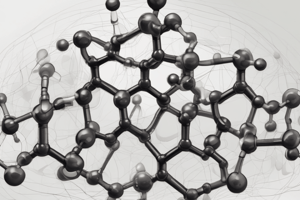Podcast
Questions and Answers
What is the defining characteristic of hydrocarbons?
What is the defining characteristic of hydrocarbons?
- Formation of ionic compounds
- High solubility in water
- Participate in various oxidation reactions
- Contain only hydrogen atoms (correct)
Which compound is formed by combining carbon with nitrogen?
Which compound is formed by combining carbon with nitrogen?
- Sulfuric acid
- Hydrogen peroxide
- Methane gas (correct)
- Calcium chloride
What determines the properties of a compound formed by carbon reacting with other elements?
What determines the properties of a compound formed by carbon reacting with other elements?
- Functional groups (correct)
- Type of reaction
- Number of carbon atoms
- Solubility in water
What distinguishes alkanes from cycloalkanes?
What distinguishes alkanes from cycloalkanes?
Why do hydrocarbons generally burn well?
Why do hydrocarbons generally burn well?
What role does the number of carbon atoms play in hydrocarbons?
What role does the number of carbon atoms play in hydrocarbons?
What type of bonds do hydrocarbons primarily have?
What type of bonds do hydrocarbons primarily have?
Which characteristic is NOT typically associated with organic compounds?
Which characteristic is NOT typically associated with organic compounds?
In carbon bonding, what type of paths do the electrons involved in forming chemical bonds move along?
In carbon bonding, what type of paths do the electrons involved in forming chemical bonds move along?
What does the carbon cycle mainly refer to?
What does the carbon cycle mainly refer to?
Which element plays a crucial role in maintaining the delicate balance needed by our planet?
Which element plays a crucial role in maintaining the delicate balance needed by our planet?
What is the primary reason why hydrocarbons are useful as fuels?
What is the primary reason why hydrocarbons are useful as fuels?
Study Notes
Carbon is a versatile element found throughout nature and is essential for life on Earth. It forms the backbone of all living organisms through various compounds containing carbon atoms. Understanding these compounds can help us grasp their role in our daily lives and the natural world around us.
Functional Groups
Carbon's ability to form four covalent bonds allows it to participate in many reactions with other elements. When combined with oxygen, nitrogen, sulfur, halogens, and other elements, carbon creates functional groups. These functional groups determine what kind of compound will ultimately result from the reaction, affecting properties such as solubility, chemical reactivity, and physical state. For example, when carbon combines with chlorine, it results in an ionic compound called calcium chloride, which has very different properties compared to a compound formed by combining carbon and nitrogen, like methane gas.
Hydrocarbons
Hydrocarbons are organic compounds composed solely of hydrogen and carbon atoms. They come in two main types: alkanes and cycloalkanes. Alkanes have straight chains while cycloalkanes have rings made up of several carbon atoms. Compounds within each type vary only according to the number of carbon atoms they contain, so there is a clear connection between the molecular formula and the name given to any particular hydrocarbon. In general, hydrocarbons burn well because they produce large amounts of heat energy. Combustion of hydrocarbons produces water vapor and releases energy that was stored in the carbon-hydrogen bonds. This makes them useful as fuels.
Organic Compounds
Organic compounds consist primarily of carbon and hydrogen, though other elements may also be present. As mentioned earlier, organic chemistry deals mainly with the behavior of these molecules under normal conditions. Some common examples of organic compounds include sugar, starches, fats, oils, proteins, amino acids, cellulose, and rubber. Many pharmaceuticals fall into this category too—drugs used to treat diseases are often derived from plant materials rich in organic compounds. Key characteristics of organic compounds are the presence of carbon and hydrogen atoms, and their existence as part of larger structures or complexes.
Carbon Bonding
When carbon combines with another atom, the resulting compound tends to distort slightly due to its tetrahedral shape. However, if you look closely enough, you'll see something interesting happening: the electrons involved in forming the chemical bonds move along paths known as sigma orbitals. These paths crisscross one another in space, creating unique patterns. Different types of chemical bonding occur between carbon and other atoms depending upon how far apart they are positioned relative to one another.
Carbon Cycle
The carbon cycle refers to the movement of carbon through Earth's atmosphere, land surface, ocean, and geological systems. Through photosynthesis, plants absorb CO₂ from the air and release oxygen. Animals consume plants and soil microorganisms decompose dead animals, releasing CO₂ back into the atmosphere. Fossil fuel burning adds additional CO₂ to the atmosphere, while volcanoes contribute small amounts naturally. The global economy depends heavily on fossil fuels; without oil, coal, and natural gas, modern society would grind to a halt.
In summary, carbon plays a crucial role in both everyday life and in maintaining the delicate balance needed by our planet. By understanding its compounds, we gain insight into the natural processes of the environment and how human actions impact these cycles.
Studying That Suits You
Use AI to generate personalized quizzes and flashcards to suit your learning preferences.
Description
Test your knowledge about carbon compounds, functional groups, hydrocarbons, organic compounds, carbon bonding, and the carbon cycle. Learn how carbon is essential for life and its role in various natural processes.




